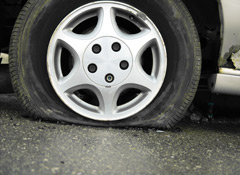Sign In

Menu
Suggested Searches
Recent Searches
Suggested Searches
Product Ratings
Resources
Chat With AskCR
Resources
All Products A-ZThe payment for your account couldn't be processed or you've canceled your account with us.
Re-activateMy account
Sign In
My account
Sign In


Consumer Reports has long advocated that drivers check their car's tire pressure monthly to prevent uneven tire wear and tire failure. Now, a new study by the National Highway Traffic Safety Administration (NHTSA) reinforces that advice by determining that vehicles driving on tires underinflated by more than 25 percent are three times more likely to be involved in a crash related to tire problems than vehicles with proper inflation. And tires underinflated up to 25 percent run the risk of overheating, leading to failure, and at the very least adversely affecting handling and tread life.
The study looked at crash data from 2005-2007--before tire-pressure monitoring systems were required to be installed on all vehicles. The systems mandated for the 2008 model year alert drivers if any tire drops 25 percent or more below the recommended inflation level of your vehicle. Tire pressure monitoring systems are designed to alert a driver of a tire losing air pressure and are not intended to be used as a substitute for monthly tire pressure checks.
The study also found that five percent of all vehicles studied experienced tire problems immediately before a crash, with 66 percent of those representing passenger cars, 17 percent being SUVs, and the rest being pickups and vans. Half of the tire-related crashes involved a single vehicle, and just 31 percent of single vehicle crashes were not related to tires.
This shows that tire problems are evident in the pre-crash phase, which has a very small window for attempting a crash avoidance maneuver. Rollovers are more common among SUVs that experienced a tire problem before a crash--45 percent rolled over. On the other hand, passenger cars, pickups, and vans experiencing tire problems had fewer than a 25 percent incidence of rollover. Overall, the study concluded that tire problems in the pre-crash phase were more likely to lead in rollover in SUVs than other types of vehicles.
Tire problems combined with other factors, such as bad weather or an inexperienced driver, can increase the likelihood of a crash.
Aside from properly inflating your tires, it is very important to monitor your tire tread depth condition. This study showed that tire-related crashes were more likely as your tire's tread wears, with accident rates at just 2.4 percent when tires had near full tread depth to 26 percent when the tires were worn- out (0 - 2 /32" depth). We recommend consumers start shopping for new tires at 4/32" tread depth while some all-weather grip is still available. At this point tire-related crashes approached 8 percent.
A 2009 NHTSA analysis found that 57 percent of vehicles with tire-pressure monitoring systems had tires that were properly inflated.
The study reiterates the need for motorists to properly maintain their tires. Buying a tire pressure gauge and regularly checking your pressure can help avoid these tire problems and the increase risk of a related crash.
Related:
Tire buying advice and Ratings
Tire gauges help keep the pressure up to ensure your safety
Guide to car maintenance
—Liza Barth
 Build & Buy Car Buying Service
Build & Buy Car Buying Service
Save thousands off MSRP with upfront dealer pricing information and a transparent car buying experience.
 Get Ratings on the go and compare
Get Ratings on the go and compare
while you shop